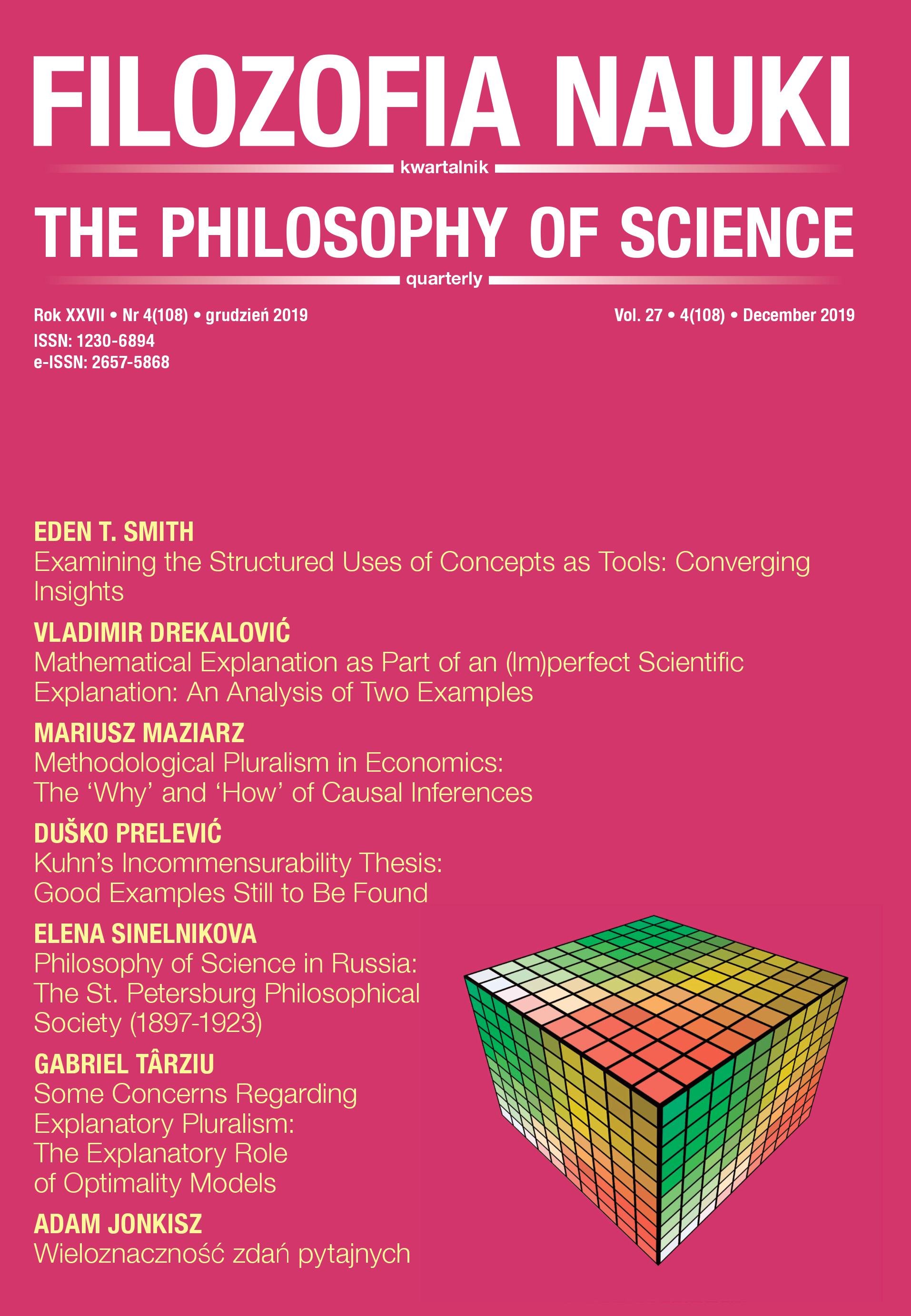Some Concerns Regarding Explanatory Pluralism: The Explanatory Role of Optimality Models
DOI:
https://doi.org/10.14394/filnau.2019.0028Abstrakt
Optimality models are widely used in different parts of biology. Two important questions that have been asked about such models are: are they explanatory and, if so, what type of explanations do they offer? My concern in this paper is with the approach of Rice (2012, 2015) and Irvine (2015), who claim that these models provide non-causal explanations. I argue that there are serious problems with this approach and with the accounts of explanation it is intended to justify. The idea behind this undertaking is to draw attention to an important issue associated with the recent pluralist stance on explanation: the rampant proliferation of theories of explanation. This proliferation supports a pluralist perspective on explanation, and pluralism encourages such a proliferation. But, if we are not careful about how we arrive at and how we justify new accounts of explanation — i.e., if we do not try to avoid the sort of problems discussed in this paper — we may end up trivializing the concept of explanation.
Bibliografia
Batterman R., Rice C. (2014), “Minimal Model Explanations,” Philosophy of Science 81(3), 349-376. https://doi.org/10.1086/676677
Elgin M., Sober E. (2002), “Cartwright on Explanation and Idealization,” Erkenntnis 57(3), 441-450. https://doi.org/10.1023/A:1021502932490
Gould S. J., Lewontin R. C. (1979), “The Spandrels of San Marco and the Panglossian Paradigm: A Critique of the Adaptationist Programme,” Proceedings of the Royal Society B: Biological Sciences 205(1161), 581-598. https://doi.org/10.1098/rspb.1979.0086
Hempel C. G. (1965), Aspects of Scientific Explanation and Other Essays in the Philosophy of Science, New York—London: The Free Press & Collier-Macmillan Ltd.
Irvine E. (2015), “Models, Robustness, and Non-Causal Explanation: A Foray Into Cognitive Science and Biology,” Synthese 192(12), 3943-3959. https://doi.org/10.1007/s11229-014-0524-0
Orzack S. H., Sober E. (1994), “Optimality Models and the Test of Adaptationism,” The American Naturalist 143(3), 361. https://doi.org/10.1086/285608
Parker G. A. (1978), “Searching for Mates” [in:] Behavioural Ecology: An Evolutionary Approach, J. Krebs, N. Davies (eds.), Oxford: Blackwell, 214-244.
Parker G. A., Maynard Smith J. (1990), “Optimality Theory in Evolutionary Biology,” Nature 348 (6296): 27-33. https://doi.org/10.1038/348027a0
Pierce G., Ollason J. (1987), “Eight Reasons Why Optimal Foraging Theory Is a Complete Waste of Time,” Oikos 49(1), 111-118. https://doi.org/10.2307/3565560
Pincock C. (2015), “Abstract Explanations in Science,” British Journal for the Philosophy of Science 66(4), 857-882. https://doi.org/10.1093/bjps/axu016
Potochnik A. (2007), “Optimality Modeling and Explanatory Generality,” Philosophy of Science 74(5), 680-691. https://doi.org/10.1086/525613
Potochnik A. (2010), “Explanatory Independence and Epistemic Interdependence: A Case Study of the Optimality Approach,” British Journal for the Philosophy of Science 61(1), 213-233. https://doi.org/10.1093/bjps/axp022
Reutlinger A., Saatsi J. (2018), “Introduction: Scientific Explanations Beyond Causation” [in:] Explanation Beyond Causation: Philosophical Perspectives on Non-Causal Explanations, A. Reutlinger, J. Saatsi (eds.), Oxford: Oxford University Press, 1-11.
Rice C. (2012), “Optimality Explanations: A Plea for an Alternative Approach,” Biology and Philosophy 27(5), 685-703. https://doi.org/10.1007/s10539-012-9322-6
Rice C. (2015), “Moving Beyond Causes: Optimality Models and Scientific Explanation,” Noûs 49(3), 589-615. https://doi.org/10.1111/nous.12042
Rose M. R., Service P. M., Hutchinson E. W. (1987), “Three Approaches to Trade-Offs in Life-History Evolution” [in:] Genetic Constraints on Adaptive Evolution, V. Loeschcke (ed.), Berlin: Springer-Verlag, 91-105.
Salmon W. C. (1984), Scientific Explanation and the Causal Structure of the World, Princeton: Princeton University Press.
Sklar L. (1993), “Idealization and Explanation: A Case Study From Statistical Mechanics,” Midwest Studies in Philosophy 18(1), 258-270. https://doi.org/10.1111/j.1475-4975.1993.tb00267.x
Strevens M. (2009), Depth: An Account of Scientific Explanation, Cambridge, MA: Harvard University Press.
Târziu G. (2018), “Mathematical Explanations and the Piecemeal Approach to Thinking about Explanation,” Logique et Analyse 61(244), 457-487.



















 Filozofia Nauki | ISSN 1230-6894 | e-ISSN 2657-5868
Filozofia Nauki | ISSN 1230-6894 | e-ISSN 2657-5868